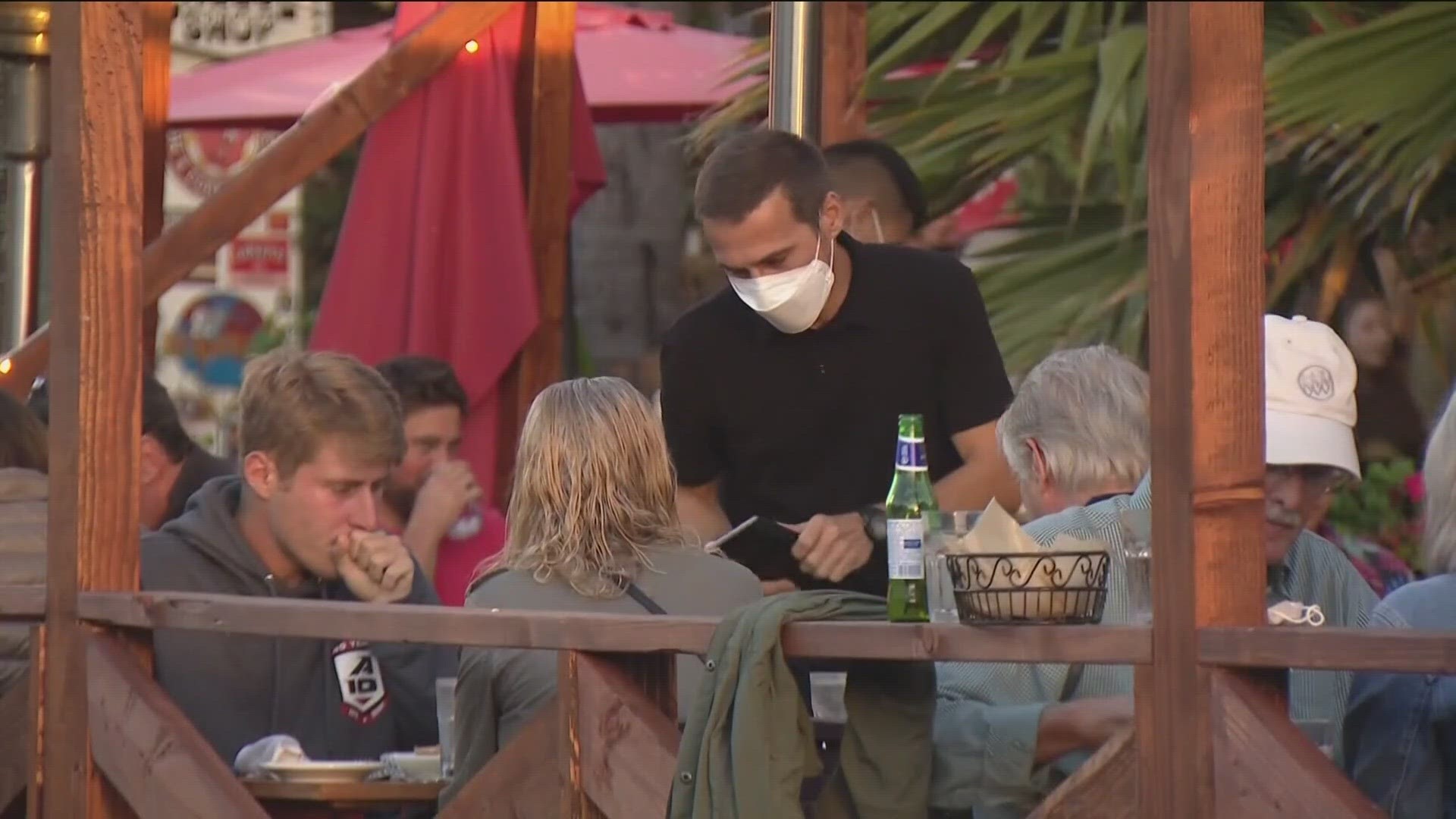SAN DIEGO — The San Diego Metropolitan Transit System announced Monday that it will be reducing bus and trolley service effective next week in the wake of COVID-19 related ridership declines, though all existing, current routes will continue running under the new schedules. The public transit service provider also announced a driver in its minibus division has tested positive for the novel coronavirus.
The bus driver who tested positive worked the following routes according to MTS:
Route: 944
Dates: Tuesday, March 31 and Wednesday, April 1
Times of Day: 8-11am
Route: 25
Dates: Tuesday, March 31 and Wednesday, April 1
Times of Day: 2-7pm
Route: 14
Date: Thursday, April 2
Time of Day: 6am-3:30pm
"The bus operator was not showing symptoms while driving and had limited contact with passengers. The operator began feeling ill Thursday night and did not report for work on Friday or Saturday," a statement on MTS's website read in part.
Effective April 13, about 70% of bus routes will be operating at reduced frequencies, according to MTS officials. Trolley lines will operate at nearly normal schedules, though the UC San Diego Blue Line trolley will revert to mid-January service levels.
The reductions will account for a 25% reduction in weekday service overall.
More than three dozen bus routes will be unaffected by the new schedules, which will be posted online at www.sdmts.com and at all MTS bus and trolley stations later this week.
Route proximity to grocery stores, hospitals and other essential areas were taken into account when determining which routes to maintain and which to reduce service to, according to MTS officials.
MTS CEO Paul Jablonski said ridership is down about 65%, though he said that even with declines, MTS is serving about 100,000 people daily.
He urged people only to ride if it's for essential services, while acknowledging that a large number of MTS users rely on transit to go to work, get groceries, go to medical appointments, and perform other necessary tasks.
For those who need to ride on MTS buses and trolleys, Jablonski said a series of measures have been taken to ensure clean conditions on MTS vehicles and stations.
With the exception of senior citizens and riders with physical disabilities, riders are asked to board MTS buses from the rear doors only, in order to prevent unnecessary proximity with drivers.
Cash payments are not being accepted by drivers as another measure to keep a safe distance between riders and bus operators.
County Supervisor and MTS Board Chair Nathan Fletcher said the ridership declines were encouraging, if for no other reason than San Diegans are doing their part to ensure physical distancing.
"This is the only time in my life when I will tell you that a reduction in transit is a good thing, but this is a good thing because it means that our community is staying home. It means that people are working together to try to limit the spread of coronavirus and we want to continue to reinforce that message, that if you can stay home, stay home," Fletcher said.
-------------------------
RELATED: San Diego County officials share resources for older adults, seniors amid stay-at-home order
View all News 8 coverage of coronavirus / COVID-19
News 8 has joined forces with The San Diego Foundation to raise immediate, emergency funds for our most vulnerable neighbors in need. Here is how you can help.
We also have a Frequently Asked Questions page we will continue updating with the latest information and reports.
Click here to watch "Facts Not Fear," a News 8 Special on coronavirus from March 26, 2020.
BACKGROUND
According to the CDC, coronavirus (COVID-19) is a family of viruses that is spreadable from person to person. Coronavirus is believed to have been first detected in a seafood market in Wuhan, China in December 2019. If someone is sick with coronavirus, the symptoms they may show include mild to severe respiratory illness, cough, and difficulty breathing.
Currently, there is no vaccine, however, the CDC suggests the following precautions, as with any other respiratory illness:
Know how it spreads
There is no vaccine
The best way to prevent illness is to avoid being exposed to the virus
It is thought to spread mainly from person-person between people in close contact
And believed to be spread by respiratory droplets produced when an infected person coughs or sneezes
Protect yourself
Wash your hands with soap and water for a minimum of 20 seconds
If soap and water aren't available, use hand sanitizer that contains at least 60% alcohol
Avoid touching your eyes, nose, and mouth
Avoid close contact with people who are sick
Put distance between yourselves and others
Protect others
Stay home when you are sick
Wear a facemask if you are sick
Cover your cough or sneeze with a tissue, then throw the tissue in the trash
If you don't have tissue, cough or sneeze into the inside of your elbow
Immediately wash your hands after coughing and sneezing
Clean and disinfect frequently touched objects and surfaces using a regular household cleaning spray or wipe
You can find information on disinfecting and cleaning on the CDC's How to Protect Yourself page.
The California Department of Public Health has issued guidance on the use of cloth face coverings to protect against the spread of the novel coronavirus COVID-19.
The County of San Diego has made face coverings mandatory for those working with the public including grocery stores, pharmacies, gas stations, convenience stores, and similar businesses.
While officials say these face coverings are not a substitute for practices like social distancing and handwashing, there is evidence to suggest that the use of cloth face coverings by the public during a pandemic could help reduce disease transmission. Officials do not recommend the public use N-95 or surgical masks which are needed by health care workers and first responders.



